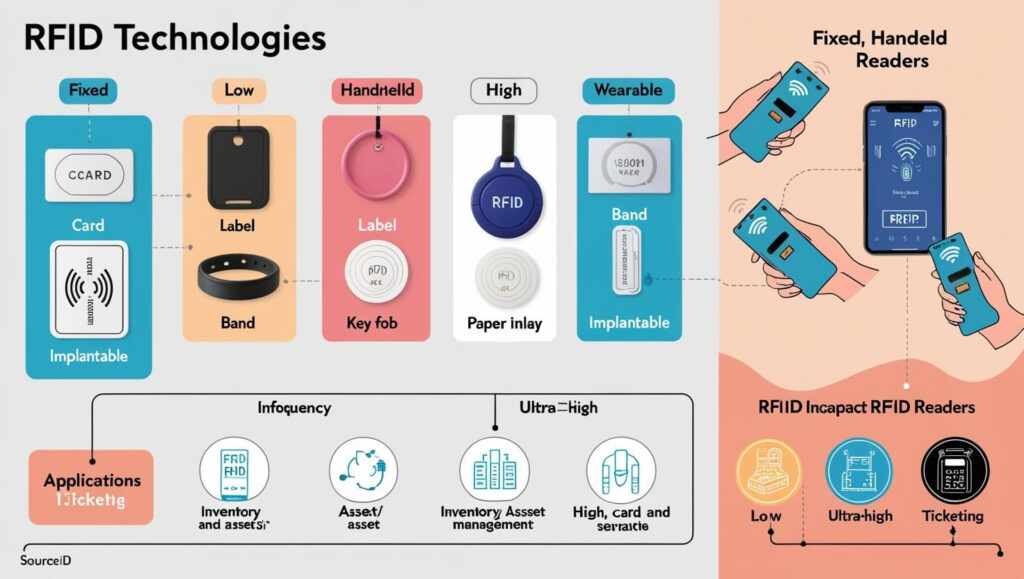Radio Frequency Identification (RFID) technology has established itself as a vital tool across industries, offering capabilities for tracking, monitoring, and managing assets with unparalleled efficiency. The RFID market is witnessing robust growth due to advancements in IoT, increasing demand for real-time tracking, and widespread adoption across sectors such as retail, healthcare, logistics, and manufacturing. RFID systems consist of tags, readers, and software, providing end-to-end solutions for data collection and analysis.
Download PDF Brochure @ https://www.marketsandmarkets.com/pdfdownloadNew.asp?id=446

RFID Market Growth Statistics
The global RFID market is projected to grow significantly, reaching USD 25.24 billion by 2033 from USD 12.61 billion in 2025, at a compound annual growth rate (CAGR) of 9.1% during the forecast period. This growth is fueled by the rising need for efficient supply chain management, inventory tracking, and enhanced operational efficiency. Sectors such as retail are leading the charge, leveraging RFID for inventory visibility and loss prevention, while healthcare, transportation, and defense are rapidly adopting the technology for asset management and security.
Impact of IoT on RFID Technology
The integration of the Internet of Things (IoT) with RFID technology has been transformative. IoT-enabled RFID systems provide real-time data analytics, seamless connectivity, and enhanced automation. This synergy has revolutionized supply chain operations, enabling predictive maintenance and intelligent inventory management. IoT also facilitates edge computing, where RFID systems process data locally, reducing latency and improving decision-making in time-sensitive applications such as healthcare and logistics.
Emerging RFID Technologies and Innovations
Recent innovations in RFID technology are driving the market forward:
- Printable RFID Tags: Advances in printed electronics have enabled cost-effective, flexible RFID tags, expanding their use in applications like smart packaging.
- Active RFID Tags: Equipped with internal power sources, active RFID tags are being deployed for long-range tracking in industries like transportation and aerospace.
- Enhanced Antenna Designs: Improvements in tag antenna designs are boosting read accuracy and range, enabling better performance in challenging environments.
- Blockchain Integration: Combining RFID with blockchain ensures secure and immutable data records, enhancing transparency in supply chain operations.
- RFID Sensors: Tags embedded with sensors are gaining popularity for monitoring environmental conditions, such as temperature and humidity, particularly in pharmaceuticals and perishable goods.
RFID Market Drivers and Restraints
Drivers:
- Demand for Real-Time Tracking: Businesses seek RFID for precise asset and inventory tracking.
- Retail Expansion: RFID adoption in retail improves inventory accuracy, enhances customer experience, and prevents losses.
- Regulatory Compliance: In sectors like healthcare and aerospace, RFID ensures compliance with stringent regulations.
Restraints:
- High Implementation Costs: Initial costs of RFID systems, including tags and infrastructure, remain a barrier for small businesses.
- Interoperability Issues: Integrating RFID systems with existing technologies can be challenging.
- Data Privacy Concerns: The growing volume of RFID data raises concerns about security and unauthorized access.
RFID Market Opportunities and Challenges
Opportunities:
- E-commerce Boom: The surge in e-commerce demands efficient inventory management and logistics solutions, driving RFID adoption.
- Smart Cities and IoT: RFID plays a crucial role in smart city applications, such as waste management and automated toll collection.
- Healthcare Advancements: RFID is increasingly used for patient tracking, medical equipment management, and improving operational efficiency.
Challenges:
- Technical Limitations: Environmental factors such as metal interference can hinder RFID performance.
- Global Standards: A lack of universal standards complicates global deployments.
- Market Competition: The emergence of alternative technologies like NFC (Near Field Communication) poses competition.
Future Applications of RFID Technology
The future of RFID technology is promising, with expanding applications across diverse sectors:
- Retail 4.0: Enhanced RFID systems will support automated checkouts, personalized shopping experiences, and real-time inventory updates.
- Healthcare Innovations: RFID will enable precision tracking of medical equipment, patient monitoring, and pharmaceutical safety.
- Industrial Automation: In manufacturing, RFID will play a pivotal role in Industry 4.0, supporting automated workflows and predictive maintenance.
- Transportation and Logistics: RFID will revolutionize fleet management, cargo tracking, and warehouse automation.
- Aerospace and Defense: Advanced RFID solutions will enhance asset tracking, security, and maintenance scheduling.
RFID technology is poised to transform industries with its ability to deliver real-time insights, streamline operations, and enhance efficiency. As IoT integration, technological advancements, and market demand drive growth, RFID systems will find innovative applications across sectors. Despite challenges, the opportunities for RFID adoption are vast, marking it as a cornerstone of modern technological ecosystems.